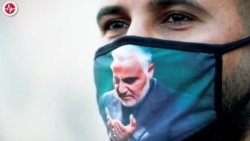On April 28 Iran’s Foreign Minister Mohammad Javad Zarif posted on his Instagram feed a video of his visit to the memorial in Iraq dedicated to Gen. Qaseem Soleimani, the former commander of Iran’s Revolutionary Guard Corps assassinated last year by a U.S. drone strike.
In a caption, Zarif cited Soleimani for “firmness, humanity, [and a] commitment to peace.”
But the post came after the leak of a lengthy interview in which Zarif candidly described Soleimani as just the opposite – an impediment to diplomacy and warmonger. Parts of the interview were broadcast April 25 by the U.K.-based Farsi language news network Iran International.
In the Instagram post, Zarif says:
“Martyr Soleimani was praised by the world for his firmness, humanity, commitment to peace and courage. The peace established today in Afghanistan and Iraq and the defeat of ISIS was more than anything due to General Soleimani’s wisdom and courage.”
Yet, in the leaked interview, Zarif essentially described Soleimani as a war hawk who controlled and undermined him. Zarif said he had “zero” influence over Iran’s foreign policy and was forced to “make this or that concession or point almost every time I went to negotiate" while following Soleimani’s instructions.
"The (military) field's success was more important than diplomacy's success. I was negotiating for the (military) field's success," Zarif said, as translated via Reuters.
Zarif also complained that in Syria operations, Soleimani used the national civilian airline Iran Air, ignoring his objections. He also said Soleimani colluded with Russia to try and sabotage the nuclear deal with the U.S. and other countries.
“I have sacrificed diplomacy for the battlefield more than the price that (those on) the battlefield (led by Soleimani) ... paid and sacrificed for diplomacy,” Zarif said, according to The Associated Press. Iran “could have achieved [more] from the nuclear deal” had it not prioritized the military, he said.
All the same, AP reported that Zafir acknowledged Soleimani’s stature in the interview, which was conducted over seven hours by an economist.
“I believe that the U.S. by hitting Martyr Soleimani dealt a blow to Iran that would not have been as bad even if they had hit one of our towns,” Zafir said.
According to Iran International’s report, Zafir said that after the nuclear deal was signed in 2015, Soleimani was invited to Russia as part of the Kremlin’s attempt to undermine the new agreement. "That trip was made upon Moscow's initiative without the Iranian Foreign Ministry having any control on it. Its objective was to destroy the JCPOA (agreement)," Zarif said.
Zarif is considered by some a potential candidate to replace outgoing President Hassan Rouhani, who cannot run again because of term limits. In the interview, Zarif said he has no intention of running in the June 18 election, Reuters reported.
Zarif was Iran’s key negotiator in the 2015 nuclear deal and in current talks to revive it with U.S. Secretary of State John Kerry. Rouhani rejected Zarif’s resignation offer last February after the U.S. withdrew from the agreement under President Donald Trump.
According to the AP, the leaked interview “set off a firestorm within Iran, where officials carefully mind their words amid a cut-throat political environment that includes the powerful paramilitary Revolutionary Guard, ultimately overseen by the country’s supreme leader.”
That no doubt explains Zarif’s Instagram post, in which he expresses regret that “a secret theoretical debate” about the need for cooperation between diplomats and the military “turned into an internal conflict” and that his “honesty and compassion” was interpreted as “personal criticism” of Soleimani, a close friend until his death.
Iran responded to Soleimani’s death with series of missile strikes on U.S. targets in Iraq on January 8, 2020. Afterward, it mistakenly shot down a Ukrainian civilian airliner, killing all 176 people on board. Tehran initially denied responsibility but later admitted the error.
In the leaked interview, Zarif said the Iranian military knew instantly it was their missile that took down the Ukrainian jet, but that he was ordered to “go tweet and deny” anyway.
The interview was part of a government legacy project and meant to be kept secret, Iran's state news agency reported. AP said Rouhani had replaced the head of the Strategic Studies Center, the think tank that conducted the interview with Zarif and was responsible for safeguarding it.






